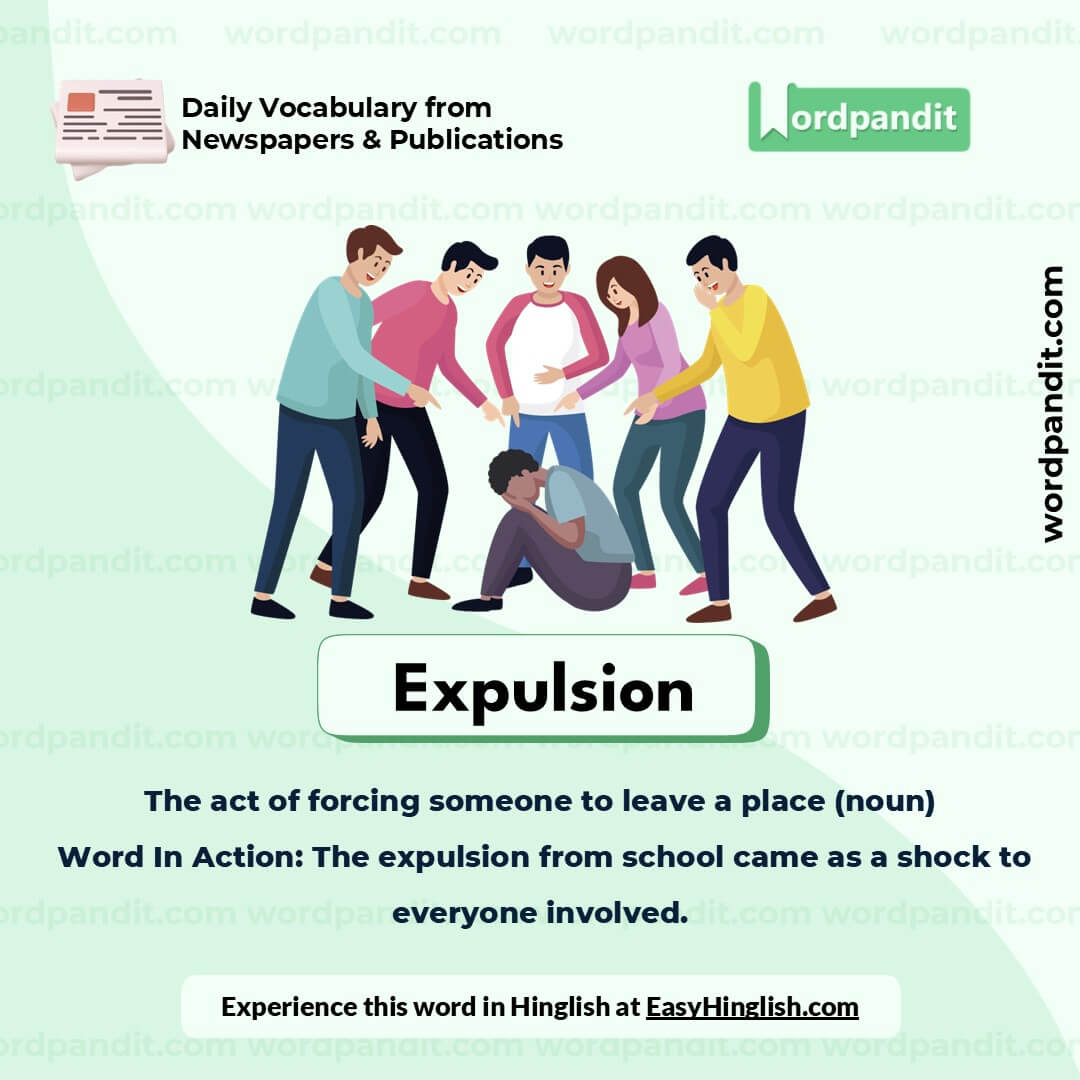Daily Vocabulary from International Newspapers and Publications
Expand Your Vocabulary with Wordpandit’s Global Vocabulary Hub
At Wordpandit, we are committed to helping you develop a truly global vocabulary by drawing from some of the most respected international publications. This section is designed to keep you ahead of the curve by introducing you to words that define global conversations and trends.
The Power of Global Sources
To help you think and communicate on a global scale, we curate vocabulary from renowned international sources, such as:
- The New York Times
- The Washington Post
- BBC
- The Guardian
- The Economist
- Scientific American
- Psychology Today
- And many more...
Stay Global, Stay Competitive
Our daily updates from international publications ensure you are consistently exposed to new words that reflect global news and developments, making sure your vocabulary is not only current but also globally relevant.
Enhance Your Global Perspective
Whether you’re preparing for international exams, aiming to excel in global business communication, or want to enhance your language skills for personal growth, Wordpandit offers the resources you need to thrive in a global context.
Effective Learning, Global Reach
Our learning methodology combines global examples, memory aids, and interactive activities, allowing you to internalize new words effectively and apply them in real-world scenarios.
Begin Your Global Vocabulary Journey Now!
Why Choose Wordpandit?
Practical Learning: Focus on words you'll actually encounter in real-world reading, enhancing your comprehension and communication skills.
Diverse Content: From current affairs to scientific breakthroughs, our varied sources expose you to vocabulary across multiple domains.
Effortless Integration: Make Wordpandit a part of your daily routine. Just a few minutes each day can significantly boost your lexicon over time.
Your Path to Vocabulary Mastery
- Visit our Daily Vocabulary section regularly
- Explore new words and their usage in context
- Practice incorporating these words into your own writing and speech
- Track your progress as your vocabulary expands
Start Your Journey Today
Embark on your vocabulary enhancement journey with Wordpandit. By consistently engaging with our daily posts, you'll build a robust vocabulary that serves you well in academic, professional, and personal contexts.
Remember, a word a day keeps linguistic limitations at bay. Make Wordpandit your daily companion in the quest for vocabulary excellence!
WORD-1: Expulsion
Context:
"The plan was put forward by retired General Giora Eiland and calls for the expulsion of Palestinians from the area." - Al Jazeera
Explanatory Paragraph:
The term expulsion refers to the act of forcefully removing someone from a place or group. It often involves taking away an individual’s right to stay in a certain area, organization, or country and is usually implemented as a result of conflict, law enforcement, or disciplinary actions.
Meaning: The act of forcing someone to leave a place (noun)
Pronunciation: ik-SPUHL-shun
Difficulty Level: ⭐⭐⭐ (Intermediate)
Etymology: From Latin expulsionem, meaning "a driving out," derived from expellere, "to drive out"
Synonyms & Antonyms:
Synonyms: banishment, ejection, deportation, eviction, ousting
Antonyms: admission, inclusion, invitation, acceptance
Usage Examples:
- The student faced expulsion from the university due to repeated violations of the code of conduct.
- Political unrest led to the expulsion of diplomats from the country.
- The organization’s policies ensure that expulsion is only used as a last resort.
- Expulsion from the group created significant social and emotional challenges for him.
Cultural Reference:
"Expulsions throughout history have often reshaped societies, affecting those forced to leave and those left behind." - Encyclopedia Britannica
Think About It:
What are the social and emotional impacts of expulsion on individuals and communities?
Quick Activity:
Think of a famous historical event involving expulsion. Write a few sentences about how it affected both those expelled and the region they left.
Memory Tip:
Remember "expulsion" as "exit under pressure," associating it with the forceful removal of someone from a place.
Real-World Application:
The word "expulsion" is frequently used in discussions on immigration policy, school discipline, and workplace regulations, making it relevant in legal, social, and political contexts.
WORD-2: Thwarted
Context:
"where several major Israeli military campaigns were thwarted." - Al Jazeera
Explanatory Paragraph:
The word thwarted describes an action that has been stopped or prevented from succeeding. When someone’s plans or efforts are thwarted, something or someone has interfered, blocking them from reaching their intended goal or outcome.
Meaning: Prevented from accomplishing something; obstructed or hindered (verb)
Pronunciation: thwort-ed
Difficulty Level: ⭐⭐⭐ (Intermediate)
Etymology: From Middle English thwerten, meaning "to twist or oppose," rooted in Old Norse thverr, meaning "transverse or across"
Synonyms & Antonyms:
Synonyms: hindered, obstructed, stymied, frustrated, foiled
Antonyms: facilitated, encouraged, assisted, promoted, advanced
Usage Examples:
- Despite their best efforts, the team’s attempts to secure the win were thwarted by a last-minute goal.
- Her plans to travel were thwarted due to unexpected weather conditions.
- Authorities thwarted the attempt to smuggle illegal goods across the border.
- His proposal to implement new policies was thwarted by opposition within the company.
Cultural Reference:
"Thwarted ambitions often serve as a powerful motivation to try again, pushing people to overcome obstacles and succeed." - Psychology Today
Think About It:
How do people typically react when their plans are thwarted, and what strategies can help overcome such setbacks?
Quick Activity:
Think of a personal experience where your plans were thwarted. Reflect on how you adapted or tried a new approach in response.
Memory Tip:
Remember "thwarted" as a "twist" in plans, where a twist or obstacle stops you from reaching your goal.
Real-World Application:
The term "thwarted" is widely applicable, from describing setbacks in personal plans to major international efforts, emphasizing the idea of facing and overcoming obstacles.
WORD-3: Steadfastness
Context:
"The spirit of steadfastness shown by the people remaining in northern Gaza." - Al Jazeera
Explanatory Paragraph:
Steadfastness is the quality of being firm, resolute, and unwavering, especially in difficult situations. It refers to a person’s ability to stay committed and hold strong in the face of adversity, often characterized by endurance and courage.
Meaning: Firm loyalty or determination; unwavering commitment (noun)
Pronunciation: STED-fast-ness
Difficulty Level: ⭐⭐⭐ (Intermediate)
Etymology: From Old English stedefæstnes, meaning "firm or fixed in place"
Synonyms & Antonyms:
Synonyms: resilience, perseverance, determination, loyalty, resolve
Antonyms: wavering, instability, indecision, irresolution, hesitation
Usage Examples:
- Her steadfastness in the face of criticism earned her great respect among her peers.
- Through years of hardship, the community’s steadfastness never wavered.
- His steadfastness to his principles guided him through challenging times.
- In times of crisis, the steadfastness of leaders is essential for stability.
Cultural Reference:
"Steadfastness is an essential trait in both personal growth and societal progress, exemplified by influential leaders and activists throughout history." - History Today
Think About It:
What role does steadfastness play in achieving long-term goals, and how does it influence the people around you?
Quick Activity:
Think of a historical figure known for their steadfastness. Write down how their commitment impacted their cause or the people around them.
Memory Tip:
Associate "steadfastness" with "steady fast," imagining someone standing firm and unwavering like a steady anchor.
Real-World Application:
Steadfastness is crucial in fields that require long-term dedication, such as activism, social work, and leadership, where remaining committed to a cause can inspire others and drive positive change.
WORD-4: Hyperbolic
Context:
"It sounds hyperbolic, it sounds hysterical." - The Guardian
Explanatory Paragraph:
The term hyperbolic describes something exaggerated or overstated, often in a way that makes it seem more extreme or intense than it really is. Hyperbolic language is commonly used for emphasis or dramatic effect rather than literal truth.
Meaning: Exaggerated or overstated, often for effect (adjective)
Pronunciation: hi-per-BAH-lik
Difficulty Level: ⭐⭐⭐ (Intermediate)
Etymology: From Greek hyperbolē, meaning "excess," derived from hyper- ("beyond") + ballein ("to throw")
Synonyms & Antonyms:
Synonyms: exaggerated, inflated, overstated, extravagant
Antonyms: understated, realistic, moderate, restrained
Usage Examples:
- His description of the event was hyperbolic, making it sound much more dramatic than it was.
- The politician’s speech was filled with hyperbolic statements to rally supporters.
- Saying, "I've told you a million times," is a hyperbolic way of emphasizing frustration.
- The media sometimes uses hyperbolic language to capture readers’ attention.
Cultural Reference:
"Hyperbolic expressions are often used in comedy and satire to add humor through exaggeration." - Literary Terms Resource
Think About It:
When is it appropriate to use hyperbolic language, and when might it create misunderstandings?
Quick Activity:
Write a short, hyperbolic sentence describing something ordinary, like waiting in line or doing homework.
Memory Tip:
Think of "hyperbolic" as "hyper-beyond," imagining something pushed beyond normal limits for effect.
Real-World Application:
Understanding hyperbolic language helps with interpreting literature, persuasive speeches, and media, where exaggeration is often used to emphasize a point or create impact.
WORD-5: Megalomaniac
Context:
"Imagine the indignation here if a rich megalomaniac offered UK voters the kind of rewards Elon Musk is currently deploying." - The Guardian
Explanatory Paragraph:
A megalomaniac is someone who has an excessive obsession with power, control, and grandiose ambitions, often believing they are far more influential or important than others. This term is often used critically to describe individuals who seek power and control in a way that may seem out of touch with reality.
Meaning: A person who is obsessed with their own power and dominance (noun)
Pronunciation: meg-uh-loh-MAY-nee-ak
Difficulty Level: ⭐⭐⭐⭐ (Advanced)
Etymology: From Greek megas meaning "great" and mania meaning "madness or obsession"
Synonyms & Antonyms:
Synonyms: egotist, narcissist, autocrat, dictator, tyrant
Antonyms: altruist, humanitarian, modest person, egalitarian
Usage Examples:
- The CEO’s megalomaniac tendencies led him to disregard the opinions of everyone else in the company.
- Critics argued that the politician’s policies revealed a megalomaniac desire for control.
- History is filled with examples of megalomaniacs who pursued power at any cost.
- His friends warned him that his megalomaniac attitude was damaging his relationships.
Cultural Reference:
"Megalomaniac characters often appear in literature and film as villains, driven by their insatiable lust for power." - Literary Devices
Think About It:
Why do you think society is often fascinated by megalomaniacs, especially in media and entertainment?
Quick Activity:
Think of a famous historical or fictional character with megalomaniac traits. Describe how their actions reflect an obsession with power.
Memory Tip:
Remember "megalomaniac" by linking "mega" (great or large) with "mania" (obsession), picturing someone with an outsized obsession with their own importance.
Real-World Application:
The term "megalomaniac" is frequently used in discussions about leadership, corporate culture, and politics to describe individuals who prioritize their power and control over the well-being of others.


















